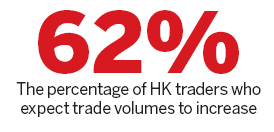HK and mainland traders expect numbers to grow
Updated: 2010-05-04 07:40
By Li Tao(HK Edition)
|
|||||||||
Traders from Hong Kong and the mainland are among the most upbeat about future demand for their products, as they believe the robust economic growth in the region, particularly in the Greater China region, will offset the sluggishness in the US and European markets, HSBC's latest survey reveals.
According to the latest HSBC Trade Confidence Index released Monday, 64 percent of mainland traders and 62 percent of Hong Kong traders expect trade volumes to increase.
Meanwhile, 53 percent of Hong Kong traders are optimistic about future trade with their counterparts from the mainland, Taiwan and Macao in the next six months.
Chris Lewis, HSBC head of Trade and Supply Chain for Greater China, said trade between Hong Kong and the mainland is stronger now than ever, where new orders from the mainland have driven Hong Kong exporters to boost capacity significantly.
Lewis said that China is, at the same time, also increasingly looking to do more mutually beneficial trade with Southeast Asia by tapping into the region's emerging domestic consumer markets as well as by playing to each market's competitive advantages in the supply chain.

Twenty percent of mainland traders, according to the survey, believe that Southeast Asia in the next six months will provide the biggest growth opportunities, up from 10 percent from the last survey.
"The evolving dynamics of intra-Asian trade has put China at the center of activity with markets like Australia, Indonesia, Malaysia and Vietnam, which continues to gear up for increased trade with this bloc," said Lewis.
Simon Constantinides, HSBC head of Trade and Supply Chain for Asia-Pacific, excluding Greater China, said as trade plays a key role in the global economic recovery, the strengthening of confidence from these global respondents over the last year, despite slow economic progress in the West and the recent crisis in the Middle East, is proof of the significance of trade.
"The axis of trade momentum has clearly shifted to the emerging markets, where the rebound in trade, fuelled by intra-regional activity, continues to boost global economic recovery. In Asia, international trade is increasingly becoming a key engine of growth for markets that were traditionally focused on domestic trade," said Constantinides.
Despite a positive outlook, traders nevertheless worry that foreign currency exchange rates may be potential barriers to growth, with over a third of traders in Hong Kong seeing exchange rates impacting their business adversely and 30 percent in the mainland being bearish about the impact of exchange rates.
Lewis said although traders continue to perceive foreign exchange as a concern, he has seen their confidence grow over time. Lewis contends that while exchange rate changes are one of the many risks that global businesses must constantly monitor in order to succeed, they are not necessarily a barrier to growth.
"On the mainland, despite anticipated yuan appreciation, exports will continue to show strong growth driven by global demand and increasingly from emerging markets," Lewis added.
The index, launched in the first half of 2009, covers a total of 17 key economies all over the global and has asked 5,120 trade-oriented small and mid-market enterprises about their six-month outlook on trade volume, buyer and supplier risks, the need for trade finance, access to trade finance, and the impact of foreign exchange and government trade regulations on their businesses.
China Daily
(HK Edition 05/04/2010 page2)